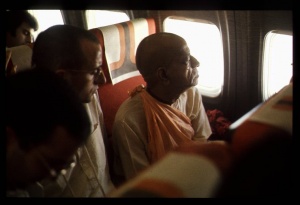SB 5.12.1: Difference between revisions
m (1 revision(s)) |
No edit summary |
||
| Line 1: | Line 1: | ||
{{info | {{info | ||
|speaker= | |speaker=King Rahūgaṇa | ||
|listener= | |listener=Jaḍa Bharata | ||
}} | }} | ||
[[Category:Srimad-Bhagavatam - Canto 05 Chapter 12|s01 ]] | |||
[[Category:Bhagavatam Verses Spoken by Rahugana Maharaja - Vanisource|051201]] | |||
<div style="float:left">'''[[Srimad-Bhagavatam]] - [[SB 5|Fifth Canto]] - [[SB 5.12: Conversation Between Maharaja Rahugana and Jada Bharata|Chapter 12: Conversation Between Mahārāja Rahūgaṇa and Jaḍa Bharata]]'''</div> | |||
<div style="float:right">[[File:Go-previous.png|link=SB 5.12 Summary]] '''[[SB 5.12 Summary]] - [[SB 5.12.2]]''' [[File:Go-next.png|link=SB 5.12.2]]</div> | |||
{{RandomImage}} | |||
==== TEXT 1 ==== | ==== TEXT 1 ==== | ||
<div class="verse"> | |||
<div | :rahūgaṇa uvāca | ||
rahūgaṇa uvāca | :namo namaḥ kāraṇa-vigrahāya | ||
namo namaḥ kāraṇa-vigrahāya | :svarūpa-tucchīkṛta-vigrahāya | ||
svarūpa-tucchīkṛta-vigrahāya | :namo 'vadhūta dvija-bandhu-liṅga- | ||
namo 'vadhūta dvija-bandhu-liṅga- | :nigūḍha-nityānubhavāya tubhyam | ||
nigūḍha-nityānubhavāya tubhyam | |||
</div> | </div> | ||
| Line 18: | Line 23: | ||
==== SYNONYMS ==== | ==== SYNONYMS ==== | ||
<div class="synonyms"> | |||
<div | ''rahūgaṇaḥ uvāca''—King Rahūgaṇa said; ''namaḥ''—my respectful obeisances; ''namaḥ''—obeisances; ''kāraṇa-vigrahāya''—to one whose body emanates from the Supreme Person, the cause of all causes; ''svarūpa-tucchīkṛta-vigrahāya''—who has completely removed all the contradictions of the scriptures by manifesting his true self; ''namaḥ''—respectful obeisances; ''avadhūta''—O master of all mystic power; ''dvija-bandhu-liṅga''—by the characteristics of a person born in a brāhmaṇa family but not executing the duties of a brāhmaṇa; ''nigūḍha''—covered; ''nitya-anubhavāya''—to him whose eternal self-realization; ''tubhyam''—to you. | ||
rahūgaṇaḥ | |||
</div> | </div> | ||
| Line 26: | Line 30: | ||
==== TRANSLATION ==== | ==== TRANSLATION ==== | ||
<div class="translation"> | |||
<div | |||
King Rahūgaṇa said: O most exalted personality, you are not different from the Supreme Personality of Godhead. By the influence of your true self, all kinds of contradiction in the śāstras have been removed. In the dress of a friend of a brāhmaṇa, you are hiding your transcendental blissful position. I offer my respectful obeisances unto you. | King Rahūgaṇa said: O most exalted personality, you are not different from the Supreme Personality of Godhead. By the influence of your true self, all kinds of contradiction in the śāstras have been removed. In the dress of a friend of a brāhmaṇa, you are hiding your transcendental blissful position. I offer my respectful obeisances unto you. | ||
</div> | </div> | ||
| Line 33: | Line 36: | ||
==== PURPORT ==== | ==== PURPORT ==== | ||
<div class="purport"> | |||
From the ''Brahma-saṁhitā'' we understand the Supreme Personality of Godhead is the cause of all causes (''sarva-kāraṇa-kāraṇam (BS 5.1)).'' Ṛṣabhadeva was the direct incarnation of the Supreme Personality of Godhead, the cause of all causes. His son, Bharata Mahārāja, who was now acting as the brāhmaṇa Jaḍa Bharata, had received his body from the cause of all causes. Therefore he is addressed as ''kāraṇa-vigrahāya.'' | |||
</div> | |||
<div | <div style="float:right; clear:both;">[[File:Go-previous.png|link=SB 5.12 Summary]] '''[[SB 5.12 Summary]] - [[SB 5.12.2]]''' [[File:Go-next.png|link=SB 5.12.2]]</div> | ||
__NOTOC__ | |||
</div> | __NOEDITSECTION__ | ||
__NOTOC__ | |||
Revision as of 07:32, 15 May 2021

A.C. Bhaktivedanta Swami Prabhupada
TEXT 1
- rahūgaṇa uvāca
- namo namaḥ kāraṇa-vigrahāya
- svarūpa-tucchīkṛta-vigrahāya
- namo 'vadhūta dvija-bandhu-liṅga-
- nigūḍha-nityānubhavāya tubhyam
SYNONYMS
rahūgaṇaḥ uvāca—King Rahūgaṇa said; namaḥ—my respectful obeisances; namaḥ—obeisances; kāraṇa-vigrahāya—to one whose body emanates from the Supreme Person, the cause of all causes; svarūpa-tucchīkṛta-vigrahāya—who has completely removed all the contradictions of the scriptures by manifesting his true self; namaḥ—respectful obeisances; avadhūta—O master of all mystic power; dvija-bandhu-liṅga—by the characteristics of a person born in a brāhmaṇa family but not executing the duties of a brāhmaṇa; nigūḍha—covered; nitya-anubhavāya—to him whose eternal self-realization; tubhyam—to you.
TRANSLATION
King Rahūgaṇa said: O most exalted personality, you are not different from the Supreme Personality of Godhead. By the influence of your true self, all kinds of contradiction in the śāstras have been removed. In the dress of a friend of a brāhmaṇa, you are hiding your transcendental blissful position. I offer my respectful obeisances unto you.
PURPORT
From the Brahma-saṁhitā we understand the Supreme Personality of Godhead is the cause of all causes (sarva-kāraṇa-kāraṇam (BS 5.1)). Ṛṣabhadeva was the direct incarnation of the Supreme Personality of Godhead, the cause of all causes. His son, Bharata Mahārāja, who was now acting as the brāhmaṇa Jaḍa Bharata, had received his body from the cause of all causes. Therefore he is addressed as kāraṇa-vigrahāya.